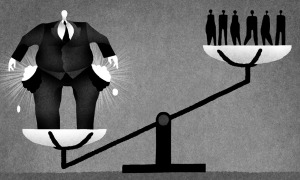
If you’re reading this blog post on a iphone or an ipad, you might like to know that between your fingers you hold a physical manifestation of inequality.
Today is Blog Action Day 2014 and bloggers from around the world have been invited to discuss inequality.
It’s a problem that’s all around us and there is a bit of complacency or even acceptance about it. We all know that there is a huge difference in the standard of living between those in different parts of the world. But with people living in grinding poverty often living so far away from us, it’s easy to feel detached. How does it involve me?

Let me return to that iphone between your hands. Yours aren’t the only hands to be placed on it. The chances are, long before your iphone was assembled, a Congolese miner working in appalling conditions mined the raw materials necessary for its construction (a UN report on mining in the Congo cited deaths from collapsed mines, child labour, and respiratory disease as features of the Coltan mining industry).
Later down the line, the iphone would have been assembled at one of Foxconn’s factories in China. The company hit the headlines in recent years due to a spate of suicides at their factories due to the miserable working conditions and low pay. The company responded by surrounding their buildings with safety nets to prevent workers jumping to their deaths.
Their workers sometimes work 12 hours shifts, 13 days in a row. In a must watch video by SACOM (Students and Scholars against Corporate Misbehaviour), a Foxconn worker says “We wake up before the roosters, sleep after the dogs, and eat worse than the pigs”.
Inequality really isn’t so far away, is it? The hands that mined the coltan, the hands that assembled it in China, the hands that sold you the iphone at the Apple store.
Here’s the  breakdown of where you money goes when you buy an iphone. Look how little of your money goes to the Chinese labour, and how much of it goes it to the bulging coffers of the Apple directors.
breakdown of where you money goes when you buy an iphone. Look how little of your money goes to the Chinese labour, and how much of it goes it to the bulging coffers of the Apple directors.
Inequality is alive, real and rife in today’s world. This isn’t about Apple, it’s about the global economic system we live in that not just allows this inequality, but needs it to survive.
So what can we do? Something. Whatever you do, do something. Share this information, boycott corporations that contribute to inequality, vote for parties that are interested in redressing the balance, join your local occupy movement and support international uprisings that are trying to bring about change.
Think of the hands that built your iphone and the hands that hold it now – should they really exist in such different worlds?
** This post was inspired by a talk at The Communication and Media Research Institute (CAMRI) at the University of Westminster by Dr. Jenny Chan from the University of Oxford, the former director of the NGO SACOM – Students and Scholars against Corporate Misbehaviour http://sacom.hk/ . An mp3 recording of the talk is available here.**


There is a book called “The new geography of jobs”, of Enrico Moretti, that explains that the United States is in a process of transference of the “bad” and unwell paid jobs to developing countries in order to concentrate its efforts in more valuable sectors, as technology, for example. In this sense, the problem goes beyond one single company.
Nevertheless, as we have discussed in the class today, there is a trade-off in campaigning. In one hand there is the need for narrowing the object of the campaign, in order to make clear demands. In the other hand there is the need for widening the scope of the campaign in order to make a real social change.
This is a really tricky situation, isn’t it?
LikeLike
When I read this really interesting post, I immediately though about the way that this situation can change.Thus I started thinking about Theories of Change.Today,it is undeniable that huge corporations such as Apple ,violate basic human rights on the altar of profit.
The worst thing is that even though people have access to information,reports and statistics(thanks to Web) about the working conditions of the employees, they behave like these things are not happening and they still buy Apple’s products. No matter how expensive these products are, no matter how many people suffer in cruel working conditions in order to “live”, these technological products have huge fans who say “NO” to reality and “YES” to the “new trend”. Imagine that in Greece for example, even though we are in crisis, the number of people who were waiting at the cue to buy Iphone 6 was extremely big(10.000 people only on November 1st).
So the big question is…how we can change this problem?Obviously, we can not use only one ToC for every country, as we are talking about different values,cultures,economical systems etc.We should start considering:
Why do we really want to have these products?Why these products seem so important to people and “they can not live without them?”.What is so special about these products that make people close their eyes to reality ?Is this a new trend?Do we live in a society that want us to be technology freaks?
For me the answer is behind the fake needs that these companies tell us that we have.That’s why I think that we should focus to the individuals-grassroots level(proper information of people about the working conditions of employees in these countries,protests,boycotts,events that support equality instead of exploitation,cooperation with NGOs and many many more) in order to change the way that people deal with technology and change the way that people prioritize what is important to them.Do we prefere gadgets instead of a normal and decent life?
LikeLike